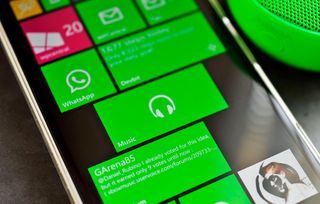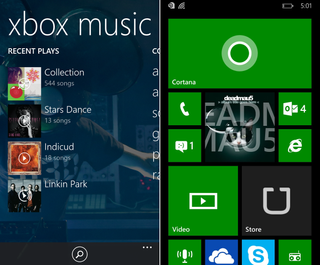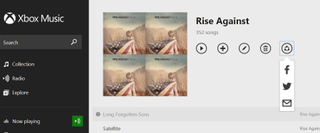Xbox Music for Windows Phone and the challenge of starting over

Let us not beat around the bush: Xbox Music on Windows Phone 8.1 has been a rough ride. Ever since the separation of the app from the OS, criticism for being behind not only the competition but behind Windows Phone 8.0 hangs around the proverbial neck of the Xbox Music team.
Earlier this week, we spoke with Jerry Johnson, Group Program Manager and Gurpratap Virdi, Director of Engineering, both of OSG Entertainment Apps about Xbox Music, including where it is heading and why it had such a rough start.
The answers may surprise you.

Remind me again, why you did this?
The question on many people's minds is why Microsoft even extracted the app from the OS in the first place. Clearly, this is a complicated task as opposed to just making a good, native player and sticking with it.
In speaking with Johnson and Virdi, the answer is a bit more nuanced as it comes down to future services that Xbox Music is likely to support. The problem is, Microsoft as a company is pivoting, and there are many things coming down the road, features that are not ready for integration into Xbox Music. The Xbox Music team says they need an app to be an "extension" of their services, and not just an endpoint. They want the flexibility of being able to update dynamically when the other half of Microsoft comes around, and not to have to shoehorn everything into a more complicated OS update.
Case in point is the rumored usage of OneDrive as a "cloud locker" for music files. Although Johnson and Virdi would not commit to that feature coming, they did note that such an extension of Xbox Music is "critical," which should tell you something. OneDrive though is undergoing numerous changes itself and those two teams need to meet at some point down the road. Xbox Music as an app can rise to meet that challenge; Xbox Music built into the OS would need to wait.
This future integration is but one example, and apparently, Microsoft – and the Xbox Music team – have plans for the service. Keeping the built-in app would severely hinder the ability to get those features to users. You do not have to look far for the rage when a Microsoft app on iOS or Android gets features that Windows Phone lacks. Compounding this issue was Xbox Music being un-updatable, hence the shift in strategy.
Get the Windows Central Newsletter
All the latest news, reviews, and guides for Windows and Xbox diehards.

Xbox Music on 8.1 should have been a beta
The problem with the aforementioned reasoning is the current user experience. Since the Windows Phone 8.1 Preview just over two months ago, Xbox Music on Windows Phone 8.1 has had seven updates, with a significant release coming tomorrow and another in two weeks.
The update tomorrow should bring with it two critical improvements:
- Recents playlist (revealed on the Windows Phone blog earlier this week)
- Up to 50% performance improvement for launching the app and scrolling within
Once Microsoft's recently announced Update 1 Preview goes live, another substantial update is coming. That update brings with it a new Live Tile and Kid's Corner, both of which depend on underlying changes to the OS found in Update 1.
Regardless of the cadence of updates, it is evident that many users still find it all underwhelming. Johnson and Virdi are under no impression otherwise, and in fact were quite honest about where they were, where they are now, and where they want to be going forward. Indeed, they now admit that the Xbox Music app when it came out with the Preview for Developers should have had a 'beta' label as a signal to users that this is far from the final product. Although a minor name change, it probably could have done a lot to fend off some of the more vociferous criticisms tossed out against the app and the team behind it (even if Windows Phone users are suffering lately from 'beta fatigue').
In my 30-minute conversation though with Virdi and Johnson, they never once tried to mask the inadequacies found with Xbox Music though they are confident that it is getting better, and it will continue to do so with more updates. The improvements are tangible, especially after the last update, but issues like doubling in the playlist still hound them as they go forward.
Part of the problem is untying – and rebuilding – the app from scratch. The other is a shift in the underlying coding language from the 8.0 app to the one 8.1. As a result, the degraded performance is significant when compared to previous releases. Even after tomorrow's update, the app will not be as fast as when it was built in, but the Xbox Music team says they are certain that they can change this in future versions, and tomorrow's update goes a long way in getting there.

Your criticism is valuable. Do more yelling (okay maybe not yelling)
One curious aspect about Microsoft that I have known about for some time, but many in our audience may not, is Microsoft's renewed attention to consumer outreach. We mention UserVoice numerous times in our past Xbox Music reporting, and it is a tool that Microsoft values. Bringing attention to the voting-board and suggestion site is evidently having a significant impact. Jerry Johnson tells us that their Xbox Music UserVoice (xboxmusic.uservoice.com) jumped from a "few hundred" visits up to 45K after our coverage – and they love it. Subsequently, they have registered more than 800 suggestions and 14K votes by the community, with five of the top 13 suggestions already completed by his team.
And yes, they read your comments here too – all of them.
Considering some of the vitriol hurled at the Xbox Music team, wading in our comments section seems like a trial by fire, but Gurpratap Virdi and Jerry Johnson say it is necessary; moreover, they enjoy the passion by the community. After all, many of you express your sentiments – even if profane – only because you want Xbox Music to be praiseworthy. They get that.
The effort by Microsoft to engage with the Windows Phone community (even in our forums, where they have reached out to some of you privately) is a relatively new approach and a rare one by a company of Microsoft's size. One could argue though that enterprises like Apple do not need to 'crowd source' their apps and services – they dictate; Microsoft's actions imply the failure to understand what customers want. There is certainly some truth in that, after all many companies do not resort to such means to make successful products. Instead, they have gurus, visionaries, and team leaders that forge a path with nary a glance to what customers are demanding.
Microsoft's methodology – if unorthodox – is at least democratic, and democracy can be messy. I still find it humbling to see Microsoft asking people what they want, letting them vote on ideas, and then prioritizing those for development. Customers having a real voice in 2014 is refreshing. Nevertheless, like all participatory systems, it is only as good as those ideas suggested and if people are voting.

Will they please add "X" feature?
Finally, many of you are possibly wondering what is the real scoop, what is in store for Xbox Music next? Virdi and Johnson would not of course share with me their feature roadmap, which is in large part decided by your top-voted suggestions, but they did give drop a few hints. Things like gapless playback, improved performance, social sharing (already part of the web version), cloud storage and more are all on their radar as registering as being relevant to users. To be sure, gapless playback, recently played, and a Live Tile are all top-voted suggestions; at least two of those get addressed in the next updates. Without committing to those remaining features, both Johnson and Virdi strongly implied those things were likely to come at some point. The question is, with Windows Phone 8.1 and Update 1 devices nearing release, is it too little too late?
That is up to you and your votes.

Daniel Rubino is the Editor-in-chief of Windows Central. He is also the head reviewer, podcast co-host, and analyst. He has been covering Microsoft since 2007, when this site was called WMExperts (and later Windows Phone Central). His interests include Windows, laptops, next-gen computing, and watches. He has been reviewing laptops since 2015 and is particularly fond of 2-in-1 convertibles, ARM processors, new form factors, and thin-and-light PCs. Before all this tech stuff, he worked on a Ph.D. in linguistics, watched people sleep (for medical purposes!), and ran the projectors at movie theaters because it was fun.
